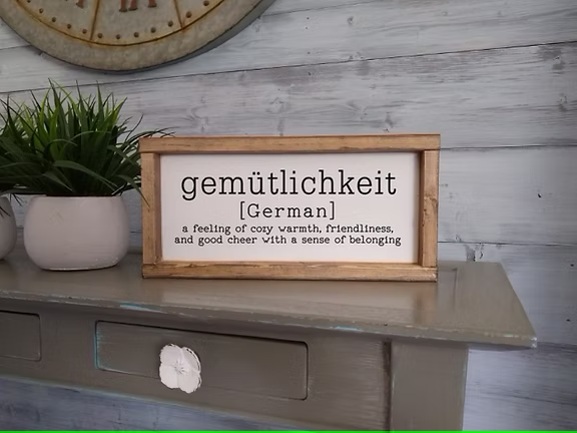
Word of the Day: Gemütlich
Today’s word of the day, thanks to www.dictionary.com, is gemütlich. Gemütlich is an adjective that means “comfortable and pleasant” (https://www.dictionary.com/e/word-of-the-day/).
Gemütlich is a loanword, which perhaps obviously means that English borrowed the word from another language, in this case Deutsch[i]. We borrow words in basically two different ways. One way is the way of the loanword: we don’t have a word for something, so we just start using the foreign word as if it were an English word. Some examples would be taco from Spanish, karate from Japanese, or moose from an Algonquian language. Sometimes, especially with older words, we have modified the spelling and/or the pronunciation of the word for one reason or another, but with other words we have adopted the word wholesale.
Keep in mind that using a loanword is not the same as using a foreign word or phrase in your writing or your speech; these words are no longer considered foreign words. Here’s how you can tell the difference. When you are writing in a formal setting, particularly in an academic setting, you are supposed to italicize (or underline) foreign words or phrases: “Although the phrase carpe diem has been around for centuries, it was popularized by the 1989 film Dead Poets Society.” Carpe diem is Latin for “Seize the day,” and while we hear it in all kinds of settings, nobody would suggest that it is an English phrase now. The words I mentioned in the previous paragraph are never italicized as foreign words because they have been adopted and Anglicized.
The other way in which we borrow from other languages is called calquing. Calquing is the process of forming a new word through translating a foreign word or phrase, and the result of the process is called a calque. This word comes into the language in “1937, from French calque, literally ‘a copy,’ from calquer ‘to trace by rubbing’ (itself borrowed in English 1660s as calk ‘to copy by tracing’), a 16c. borrowing by French of Italian calcare, from Latin calcare ‘to tread, to press down’” (https://www.etymonline.com/search?q=calque).
A couple of examples of calques from Deutsch are superman (from Übermensch) and worldview (from Weltanschauung). Milky Way calques the Latin via lactea, and Devil’s advocate calques the Latin advocātus diabolī, “referring to an official appointed to present arguments against a proposed canonization or beatification in the Catholic Church” (https://en.wikipedia.org/wiki/List_of_calques). Moment of truth calques the Spanish el momento de la verdad, the final sword thrust in a bullfight (ibid.), and Blue-blood calques the Spanish sangre azul. And somewhat ironically, the word loanword is a calque of the Deutsch Lehnwort.
My father was a Lutheran pastor who grew up in a Deutsch area of Philadelphia. His grandfather came over from Deutschland, and he did speak some Deutsch. In fact, a couple of blocks from my father’s church, Salem Lutheran Church, there was a Hungarian/German Lutheran church (this was in Bethlehem, PA, where I grew up). When the pastor of the Hungarian/German church needed a Sunday off, my father would supply for the Deutsch service, conducting the service and preaching the sermon in Deutsch. He would occasionally use Deutsch with us: for instance, when we kids wanted something unnecessary and espensive, instead of saying something about a money tree in the backyard, he would say that he needed a Geldscheißer (I’ll let you look that one up).
He also occasionally used the Deutsch term Gemütlichkeit, which on Google translate comes up as coziness, but my dad said that there was not a really good, accurate translation of the word. We also grew up saying “Gesundheit” when someone sneezed. Gesundheit is a Deutsch word that roughly translates as health. According to www.etymonline, it entered the language in “1914, from German Gesundheit, literally ‘health!’, from Old High German gisunt, gisunti ‘healthy’” (https://www.etymonline.com/search?q=Gesundheit). According to Merriam-Webster, “it was formed by a combination of gesund (‘healthy’) and -heit (‘-hood’)” (https://www.merriam-webster.com/dictionary/gesundheit).
Of course, the line between a word that has been Anglicized and a word that is still a foreign word may be a bit fuzzy. I had a professor, Dr. Gordon, in grad school who told this story. He was traveling in Deutschland with his wife. They were in a small, out-of-the-way town where they had stopped in at a small café for lunch. He noticed a group of American women sitting at the table nearby, and they were struggling because the server didn’t speak English and the women didn’t speak German (this was many years ago). In another part of the café, someone sneezed, and someone else said, “Gesundheit.” And one of the women at the American table said, “Finally, someone who speaks English.”
Today’s image is from somebody’s marketing page, where they are trying to sell a DIY sign. I just like it. https://www.therozyhomebykelly.com/product-page/diy-kit-gemutlichkeit-sign
[i] There has been an emphasis in American English (and perhaps other Englishes) in the last few decades on calling people what they would prefer to be called or on what they call themselves, so I choose to use Deutsch; “Deutschland is an endonym, or an ‘inside name’ — in other words, it’s the name Germans use to refer to their own country since around the eighth century” (https://www.babbel.com/en/magazine/why-is-germany-called-deutschland). The website adds, “The etymology of Deutschland is pretty simple. The word deutsch comes from diutisc in Old High German, which means ‘of the people.’ Land literally just means ‘land.’ In other words, Deutschland basically means something to the effect of ‘the people’s land.’”